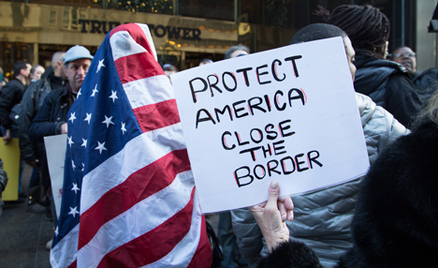Xenophobia’s unlearned lesson

Presidential elections have rarely gone well for major political parties that embrace anti-immigrant rhetoric and policies offending newcomers and, more importantly, their politically powerful ethnic allies. The Federalist Party helped put itself out of business in the 1810s by advocating nativist restrictions on immigrant rights, fueling huge losses beyond New England. In 1844, Henry Clay and the Whig Party failed to capture the White House after their campaign railed against Catholic immigrants. Convinced that their anti-immigrant and anti-Catholic appeals cost them crucial votes in states like New York, the Whig Party distanced itself from nativist groups by the next election.
James Blaine became the first post-Civil War Republican to lose the presidency in 1884 after he failed to denounce a prominent supporter who attacked Democrats as the party of “rum, Romanism, and rebellion”—widely regarded as a slur against Irish Catholics. Democrats assailed his silence, and Grover Cleveland eked out narrow victories in northern states such as Connecticut, New Jersey, and New York, thanks to overwhelming Irish Catholic support. By the next election, Republicans disavowed anti-Catholic and anti-immigrant views.
The same scenario has played out in recent elections. For instance, Robert Dole’s GOP presidential bid in 1996 was hurt badly by his party’s efforts to deny public benefits to immigrants, scale back legal immigration, and eliminate birthright citizenship for children of undocumented immigrants. Asian and Latino voters responded by flocking to the Democratic column. This led George W. Bush and the Republican establishment to rebrand their party as friendly to immigrant rights and admissions in 2000 and 2004.
Yet nativist appeals proved to be potent political catnip for GOP voters just four years later, as the party’s 2008 presidential hopefuls blamed immigrants for taking jobs, importing drugs and disease, and exposing the country to terrorist threats. Mitt Romney further angered immigrants and their allies by encouraging “self deportation” and endorsing Arizona’s controversial “show me your papers” law.
The GOP’s disastrous showing with Latino and Asian voters in the 2012 election led to a Republican National Committee “autopsy” report that called for calmer rhetoric and a willingness to compromise on immigration reform. But the party’s conservative base was in no mood for lectures on political expediency. Instead of pivoting, GOP presidential hopefuls in 2016 doubled down on vilifying undocumented immigrants and other newcomers for a litany of national ills. Forget dog whistles. Donald Trump’s assault on new immigrants—from casting Mexican immigrants as rapists and murderers to demanding a Muslim ban—has reached ear-splitting decibels.
Amidst all the outlandish twists and pyrotechnics of this year’s election, we should not miss the fact that no major U.S. party in modern times has so openly antagonized immigrants and their kindred ethnics two elections in a row. During the 20th century, U.S. politicians could easily target undocumented immigrants for political castigation and win votes.
But today most naturalized immigrants, their children, and a vast majority of Latino and Asian voters view these appeals as a broader attack on nonwhite newcomers and their communities. Over the last three presidential elections, the GOP share of the Latino vote has dropped from 44 percent in George W. Bush’s successful 2004 run, to 37 percent in 2008 and 28 percent in 2012; in the same contests, its share of the Asian vote declined at a nearly identical rate of 44 percent to 37 percent to 27 percent. (In 1992, for comparison, George Herbert Walker Bush won a staggering 72 percent of the Asian vote).
This November, Asian and Latino voters will comprise nearly a third of all presidential ballots. There is little doubt that Trump and down-ticket Republicans can expect harsh—even record-breaking—electoral reprisals from new immigrant voters and their ethnic allies. The real question is how irrevocable the damage will be for the GOP and its capacity to repair its relationship with America’s fastest growing populations.
Daniel Tichenor is the Philip H. Knight Professor of Political Science and a program director and senior scholar of the Wayne Morse Center for Law and Politics at the University of Oregon. He has published extensively on immigration politics and policy, including Dividing Lines: The Politics of Immigration Control (Princeton) and The Politics of International Migration (Oxford). He wrote the "Reluctant reformer" essay for Volume 4: Controlling the borders.